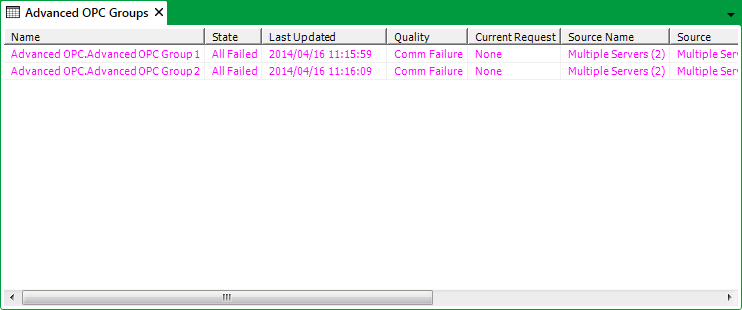The Advanced OPC Group List provides a summary of the status of Advanced OPC Groups in the database.

As with other Lists, the Advanced OPC Groups List consists of rows and columns. Each row represents an individual group, and each column contains status information about the group.
The Advanced OPC Groups List contains the following columns:
- Name—The full name of each group, including its path within the Geo SCADA Expert database.
- State—This indicates the state of the group in a server, if more than one server is associated with the group then the state of the group in each server is shown, (see Group State).
- Last Updated—The time and date that a group’s state last changed. This entry is identical to the Last Updated attribute on the group’s Status display.
- Quality—This indicates the reliability of the value that last caused a group to change state, see Quality.
- Current Request—This shows a description of the current request that the group is currently performing, or 'None' if the group is idle.
- Source Name—If the group is only associated with one server then the Server ProgID of the server is displayed. If the group is associated with more than one server, then the number of servers is indicated, (see Source).
- Source—If the group is only associated with one server then the Server ProgID of the server is displayed. If the group is associated with more than one server, then the number of servers is indicated, (see Source).
- Current Server—This indicates the name of the server that the group is currently using. In a multi -server environment the group is only active in one server.
- Type—This indicates the database item type.
- Memory Usage—The approximate amount of system memory used by the group, specified in bytes.
- Alarm View—The currently configured Alarm view for each group item.
As with other Lists, you can right-click on an entry in the List to display a context-sensitive menu. From this menu, you can select options to display further information about an Advanced OPC Group Report, or request various actions. For information on the actions that are Advanced OPC Group specific, (see Actions Associated with Advanced OPC Groups).